Norvic Philatelics - GB New
Stamps and Special Postmarks
Fire and Rescue Services - 1
September 2009
A
set of 6 stamps depicting the various duties and activities undertaken
by the country's Fire & Rescue Services personnel.
In recent years changes in the environment have placed greater demands
on the fire service. During widespread flooding in 2007, fire
crews rescued over 9,000 people as more than 55,000 homes and
businesses were flooded, and with around 5 million people thought to be
living in flood-risk areas, the threat of severe flooding remains.
Reacting to a major incident has always been one of the true tests of
an emergency service, and it certainly proved to be the case in
December 2005 when a total of 31 Fire and Rescue Services joined forces
to tackle a huge fire at the Buncefield
oil
storage depot in Hemel Hempstead.
More than 40 people were injured following a series of large
explosions, but fortunately no fatalities were recorded during this
serious and dangerous incident. Firefighters controlled the blaze by
using a massive 786,000 litres of foam concentrate, 53 million litres
of fresh water and 15 million litres of recycled water.
Every day brings new challenges for the UK’s fire crews, but
these highly trained men and women are ready for anything.
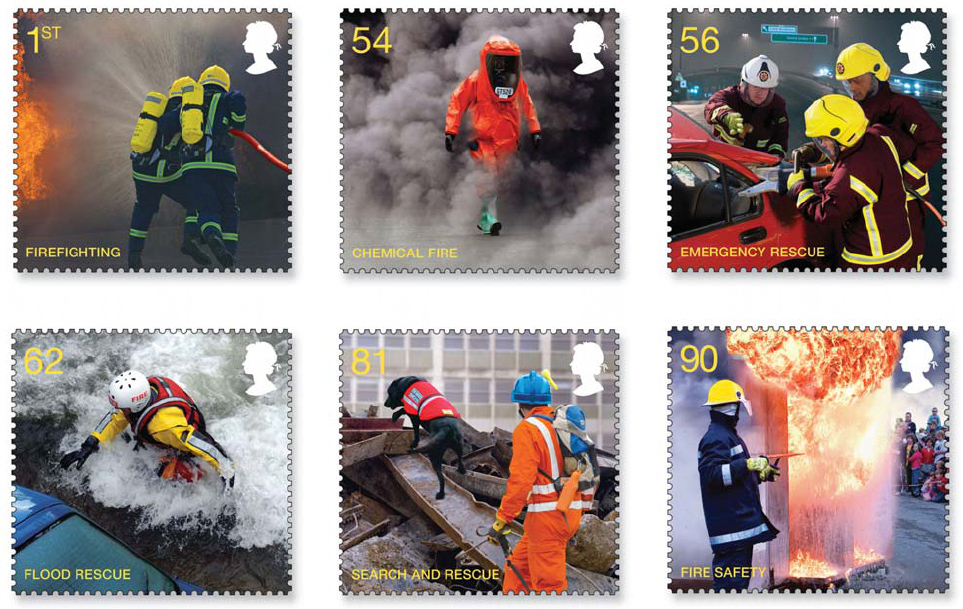
|
|
|
Set
of 6 stamps:
1st - firefighting
54p Chemical Fire
56p Emergency Rescue
62p Flood Rescue
81p Search &
Rescue
90p Fire Safety
|
Brief descriptions - stamp by
stamp
1st Class –
Firefighting
The firefighters of the UK’s 58 Fire and Rescue Authorities
are well trained in tackling the types
of incidents described below – but it wasn’t always
the case. There has been evidence of
organised firefighting in Britain since the Roman invasion of AD 43,
but it took the Great Fire of
London in1666 to move things forward. Insurance companies offering the
first type of fire cover
were formed, enabling citizens to pay to protect their home or business
in the unfortunate event
of a fire.
The same firms also established private fire brigades specifically to
respond to emergency calls
from their policy-holders. Nine years after the Edinburgh Fire Engine
Establishment was created
in 1824, several London insurance companies merged to set up the first
London fire brigade,
laying the foundations for the modern fire service.
Modern day firefighters working for the UK’s Fire and Rescue
Services are primed and ready to
deal with a wide range of emergencies. Every shout is different from
the last – from house fires
caused by faulty electrical appliances or out-of-control barbecues to
warehouse blazes, factory
fires or arson attacks.
54p – Chemical
Fire
Most of Britain’s Fire and Rescue Services have at least one
chemical incident unit whose firefighters have been trained to deal
with emergencies involving hazardous materials. Key roles
include the containment of spillages, decontamination and environmental
protection. Specialist apparatus, which varies between units,
includes: radiation-monitoring equipment, chemical containment and
absorption materials, leak-sealing equipment, foam concentrate, pumps
for pumping up industrial chemicals, and drain blockers.
56p – Emergency
Rescue
According to figures for 2007 released by the Department for Transport,
there were a total of 182,115 road accidents involving personal injury,
of which 27,036 involved death or serious injury. First on the scene of
many road traffic accidents are members of the Fire and Rescue Service.
In addition to putting out vehicle fires, the fire crew must
ensure that the surrounding area is made safe and the spillage of any
hazardous substance is contained. In more serious collisions,
firefighters are involved in freeing individuals trapped in the
wreckage.
62p – Flood
Rescue
According to the Environment Agency, around 5million people in England
and Wales now live in flood risk areas, and with the UK’s
weather becoming evermore extreme, the nation’s Fire and
Rescue Services now play a key role in responding to flood-related
emergencies. In summer 2007, widespread flooding placed
great demands on the fire service. More than 55,000 homes and
businesses were flooded, with over 9,000 people rescued. In terms of
scale, the Fire Brigades Union described the rescue effort as
‘the biggest in peacetime Britain’.
81p – Search and
Rescue
Firefighters with training in urban search and rescue (USAR) techniques
use specialist equipment to lift, cut away and remove debris from
collapsed buildings and damaged vehicles to make the area safe enough
to search for casualties trapped inside. Members of each
USAR unit are trained to use a range of specialist apparatus, including
listening devices, communication probes, technical search cameras,
cutting, drilling and breaking tools, heavy-capacity airbags, and
propping and shoring equipment. Specially adapted vehicles are also
used in USAR work.
90p – Fire Safety
Fire authorities across the UK have a long tradition of maintaining
vital links within their local communities. From school visits and fire
prevention talks to safety checks and smoke alarm tests in the home,
local fire services play an important role in community life.
In 2002 the London Fire Brigade established Local
Intervention Fire Education (LIFE) – an intensive five-day
course that enables young people to learn a range of skills, including
handson firefighting, first aid and fire prevention. LIFE has since
been adopted by a number of regional fire services.
Technical details:
Designed by Rose Design the six 37 x 35mm stamps are printed in gravure
by De La Rue Security Print Ltd. Perforations are 14 x
14˝ and phosphor is 'all-over'.
Photographic credits: Firefighting
© Ian Miles-Flashpoint Pictures/Alamy; Chemical
Fire
© Getty Images and Nikki Edmunds/Alamy; Emergency
Rescue
© Liam Bailey, 2008 and Charles Sturge/Alamy; Flood
Rescue
© Jack Sullivan/Alamy and Jeff Morgan environmental
issues/Alamy; Search and Rescue
© Matthew Mawson/Alamy, Manor Photography/Alamy and Larrie
Barlow, Crown copyright, The Fire Service College; Fire
Safety
© Jack Sullivan/Alamy and Justin Kase/Alamy
All
images are by kind permission of Royal Mail, Copyright 2008/9.
This website is copyright Norvic Philatelics 2009.
Products
issued
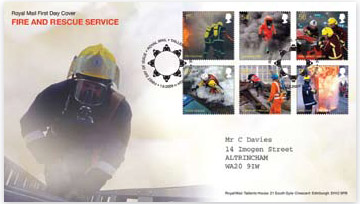
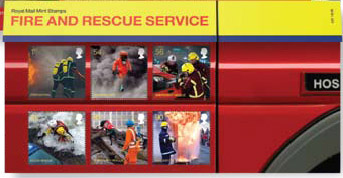
Mint set
Royal Mail FDCs
Presentation Pack
Set of 6 Stamp Cards
Special
Postmarks
Postmarks available for the day of issue are shown here, others will be
added later. These are
not to scale. These
postmarks cannot
be obtained after the date of issue.
 |
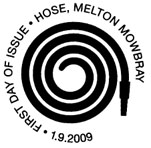 |
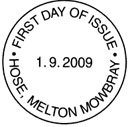
|
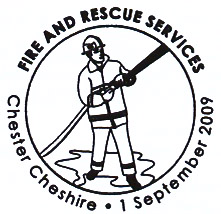
|
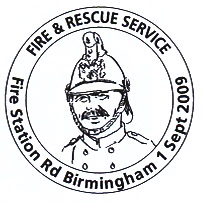
|
Ref FD923
Philatelic Bureau Official Postmark illustrated with life-saving
equipment. |
Ref FD804
Hose, Melton Mowbray, official postmark illustrated with a coiled
fire
hose |
Ref FD804NP
Hose Official non-pictorial Postmark |
Ref W11447
Fire and Rescue Services, Chester, Cheshire |
Ref M11443
Fire & Rescue Service, Fire Staton Road, Birmingham |
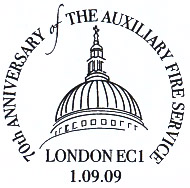
|
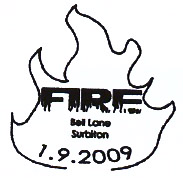
|
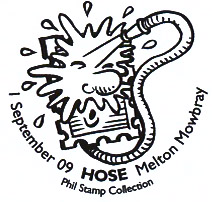
|
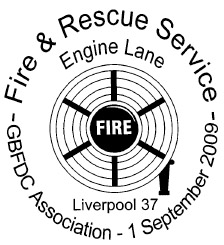
|
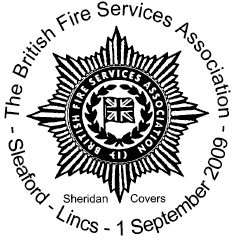
|
Ref L11440
70th Anniv of the Auxiliary
Fire
Sevice, London EC1 |
Ref L11441
FIRE Bell Lane, Surbiton |
Ref M11442
Hose, Melton Mowbray |
Ref N11461
Engine Lane, Liverpool (GBFDC Association) |
Ref N11462
The British
Fire Services Association,
Sleaford, Lincolnshire |
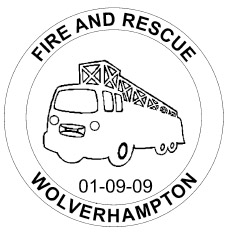
|
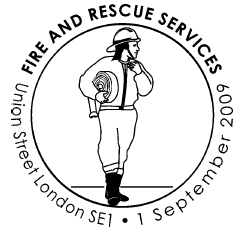
|
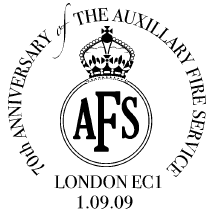
|
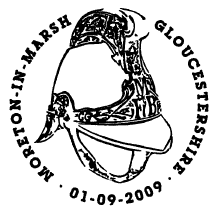
|
|
Ref M11457
Fire and Rescue, Wolverhampton |
Ref L11465
Union Street, London SE1 |
Ref L11466
70th Ann of the Auxiliary Fire Service |
Ref M11486 Moreton-in-Marsh,
Gloucestershire (location of Fire
Services
College) |
Note:
These last three handstamps were announced after the stamps were
issued.
If you would like a cover with one of these handstamps please
order
by 11 September |
This page updated 8 September
2009
If
you wish to be told when this page is updated, please use the
ChangeDetection box at the top of this page.
If you have any questions,
please email
us.
NB:
all emails will be
acknowledged in 1-2 days unless we are away (see home page). If you
do not receive an acknowledgement please email us from a different
address (eg hotmail, gmail).
















